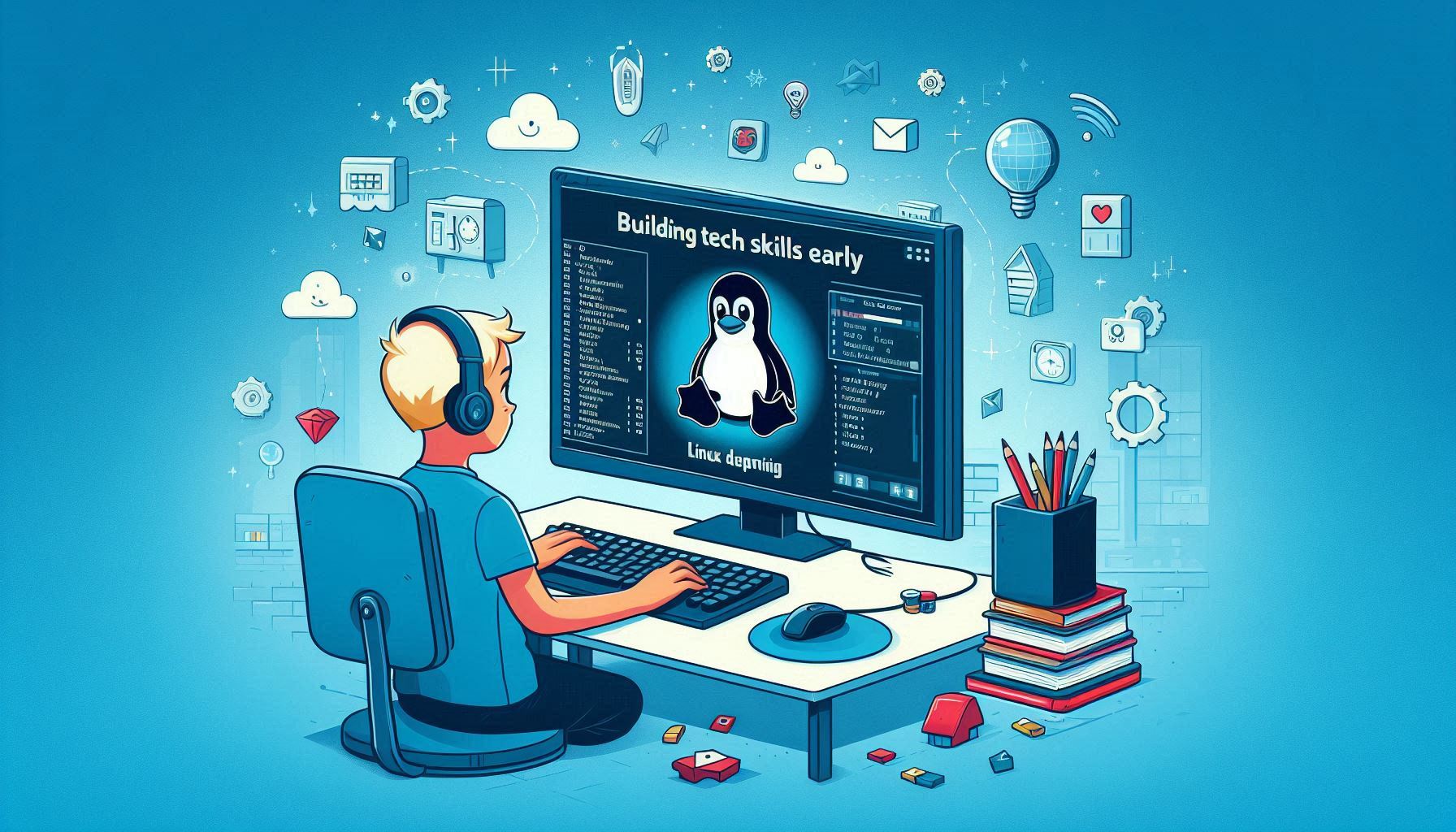Building Tech Skills Early: Why Linux is Great for Children
 Anand Khokhar
Anand Khokhar
In today’s rapidly evolving digital landscape, fostering tech skills from a young age has become increasingly important. As technology continues to integrate into every aspect of our lives, understanding how to navigate and utilize digital tools can provide children with a competitive edge and foster a lifelong passion for technology. One effective way to introduce kids to the world of computing is through Linux, an open-source operating system that offers a unique and educational experience. Here’s why building tech skills early with Linux can be an excellent choice for children.
1. A Hands-On Learning Experience
Linux offers a hands-on learning environment that allows children to engage with technology at a deeper level. Unlike proprietary operating systems, Linux provides users with extensive control over their computing environment. This means that children can explore system settings, modify configurations, and understand the inner workings of their computer in a way that is both educational and empowering.
For instance, Linux distributions such as Ubuntu or Fedora offer a user-friendly interface while still allowing access to powerful system tools. This balance helps children learn about file systems, software installation, and troubleshooting in a practical, real-world context.
2. Encouraging Problem-Solving Skills
One of the most valuable skills that Linux can help develop is problem-solving. Linux is known for its flexibility and customizability, which often means that users encounter challenges and issues that require creative solutions. For children, this can be an excellent opportunity to develop critical thinking skills.
When kids encounter a problem or need to configure a new feature, they must research solutions, test different approaches, and learn from their mistakes. This iterative process helps build resilience and problem-solving abilities that are valuable in both academic and real-world scenarios.
3. Promoting Open-Source Values
Linux is a shining example of the open-source model, which is built on principles of collaboration, transparency, and community-driven development. Introducing children to Linux not only familiarizes them with the technical aspects of the operating system but also instills values associated with open-source software.
By participating in the Linux community, children learn about the importance of sharing knowledge, contributing to collective projects, and respecting intellectual property. These values can foster a sense of responsibility and ethical behavior in the digital world.
4. Exploring Programming and Scripting
For children interested in programming, Linux provides an excellent platform for learning coding and scripting. Many Linux distributions come with a variety of programming languages and tools pre-installed, such as Python, Perl, and Bash scripting.
Children can experiment with writing simple programs, automating tasks, and developing their coding skills in a supportive environment. Additionally, Linux’s support for various development environments and integrated development tools makes it easier for young programmers to start building their projects.
5. Developing a Foundation in System Administration
As children grow older and their tech skills advance, having a foundation in system administration can be highly beneficial. Linux offers an opportunity to learn about system management tasks such as user permissions, software updates, and network configuration.
Understanding these concepts from an early age can prepare children for more advanced IT roles in the future. It also provides them with practical skills that are applicable in various fields, from cybersecurity to network engineering.
6. Encouraging Creativity and Customization
Linux is known for its high level of customization, which allows users to personalize their computing experience. For children, this aspect of Linux can be particularly engaging and motivating. They can choose from different desktop environments, install custom themes, and tweak settings to suit their preferences.
This creative freedom encourages children to experiment and express their individuality through technology. It also helps them develop an appreciation for design and user experience, skills that are increasingly relevant in today’s digital world.
7. Access to Educational Resources
The Linux community is rich with educational resources and support. Many Linux distributions offer extensive documentation, forums, and online communities where users can seek help and share knowledge. These resources can be invaluable for children as they explore Linux and encounter new challenges.
Additionally, there are numerous educational programs and projects within the Linux ecosystem designed specifically for young learners. For example, programs like Raspberry Pi offer educational kits and activities that introduce children to computing concepts through hands-on projects.
8. Building Confidence and Independence
Learning to use and manage an operating system like Linux can significantly boost a child’s confidence and sense of independence. As they gain proficiency in navigating the Linux environment and solving problems, they will feel a greater sense of achievement and self-reliance.
This increased confidence can have positive effects beyond the technical realm, helping children approach challenges with a more proactive and resilient mindset. It also fosters a sense of ownership over their learning journey and technological skills.
9. Preparing for Future Career Opportunities
In today’s tech-driven job market, having a background in Linux and open-source technologies can be a valuable asset. Many technology companies use Linux servers and tools, and proficiency in this area can open doors to various career opportunities in IT and related fields.
By introducing children to Linux early on, you’re providing them with a head start in developing skills that are highly relevant in the tech industry. This early exposure can also help them make informed decisions about their future career paths and educational pursuits.
10. Fostering a Lifelong Passion for Technology
Ultimately, introducing children to Linux and tech skills can help foster a lifelong passion for technology. The open-source community, problem-solving challenges, and creative possibilities offered by Linux can inspire children to continue exploring and innovating in the tech field.
Whether they pursue a career in technology or simply enjoy using technology as a tool for creativity and problem-solving, the skills and experiences gained through Linux can have a lasting impact on their personal and professional lives.
Conclusion
Building tech skills early is crucial in today’s digital age, and Linux offers a unique and educational platform for children to start their tech journey. From hands-on learning and problem-solving to exploring programming and customization, Linux provides a wealth of opportunities for young learners. By introducing children to Linux, you’re not only equipping them with valuable technical skills but also instilling important values and fostering a lifelong passion for technology. As they grow and develop, these skills and experiences will serve as a strong foundation for their future endeavors in the ever-evolving world of technology. Whether they are exploring Linux for kids or diving deeper into more advanced topics, this early exposure will be invaluable.
Subscribe to my newsletter
Read articles from Anand Khokhar directly inside your inbox. Subscribe to the newsletter, and don't miss out.
Written by

Anand Khokhar
Anand Khokhar
A resourceful and determined professional at Pixa Ocean, thrives on tackling challenges with creativity and innovation.